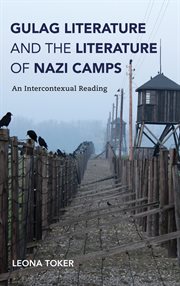Nonfiction
eBook
Details
PUBLISHED
Made available through hoopla
DESCRIPTION
1 online resource
ISBN/ISSN
LANGUAGE
NOTES
A literary scholar examines survival narratives from Russian and German concentration camps, shedding new light on testimony in the face of evil. In this illuminating study, Leona Toker demonstrates how Holocaust literature and Gulag literature provide contexts for each other, especially how the prominent features of one shed light on the veiled features and methods of the other. Toker's analysis concentrates on the narrative qualities of the works as well as how each text documents the writer's experience in a form where fictionalized narrative can double as historical testimony. Toker also views these texts against the background of historical information about the Soviet and the Nazi regimes of repression. Writers at the center of this work include Varlam Shalamov, Primo Levi, Elie Wiesel, and Ka-Tzetnik, and others, including Aleksandr Solzhenitsyn, Evgeniya Ginzburg, and Jorge Semprún, illuminate the discussion. Toker also provides context for references to potentially obscure historical events and shows how they form new meaning in the text
Mode of access: World Wide Web







